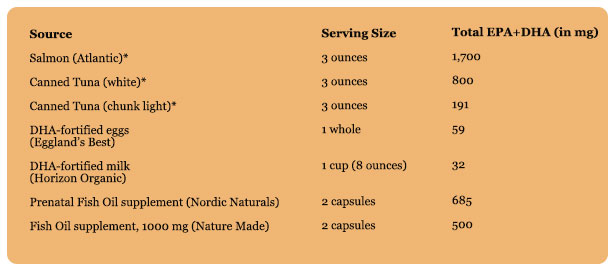
Congratulations! You’re pregnant and you know your calorie needs have increased to support your growing baby. But, your new calorie goals are not a free pass to eat anything and everything you can get your hands on (Hardly! Most pregnant women need just 300-450 extra calories per day during pregnancy and breastfeeding). Pay attention to the quality and type of nutrients you need, perhaps most importantly omega-3 fatty acids.
What are omega-3s?
Omega-3s are a type of unsaturated fat. There are three main types found in the foods we eat: ALA (alpha-linolenic acid), which is the shortest of the three and found in plant foods; EPA (eicosapentaenoic acid) which is found in marine-based foods such as fish and algae and often alongside its longer-chain relative, DHA (docosahexaenoic acid).
DHA, in particular, has been extensively studied and is associated with brain and visual development in developing babies and infants, and cognitive health and heart health in adults. “DHA is the dominant fat in the brain and is part of every brain cell your child has or will have,” says Elizabeth M. Ward, dietitian, mother, and author of
Expect the Best, Your Guide to Healthy Eating Before, During, and After Pregnancy.
In theory, the body can elongate ALA to EPA and DHA, but in actuality the body converts ALA to EPA and DHA at an extremely low rate (less than 5 percent). Your best bet is to get EPA and DHA directly from foods and supplements.
Why omega-3s matter
During pregnancy, nutrients such as omega-3s are passed from mom to baby through the placenta. These fatty acids, primarily DHA, help the brain grow and form neural networks and develop the retinas of the eyes. Studies show that DHA is passed more rapidly from mom to baby in the second half of pregnancy, when the brain is growing at a faster rate. In fact, the growing baby’s brain can triple in size in the last trimester. The body can store DHA, and will tap into those stores when the need for the nutrient is greater, so it’s a good idea to make sure you’re getting enough DHA throughout pregnancy.
While there are no specific guidelines on omega-3 supplementation for pregnant women by medical professional organizations in the U.S., new research found that taking omega-3 supplements during pregnancy can help prevent early preterm birth, or babies born before 34 weeks, by as much as 58 percent. Carrying a baby full-term is ideal for the health and long-term development of the child.
The benefits of omega-3s continue even after the baby is born. From ages zero to two years, nerve cells in the brain and throughout the body are getting covered in myelin sheaths—layers of fat that protect nerve cells and help them communicate from one to one another. That’s why babies require naturally fatty, DHA-rich breast milk (when mom’s diet is also rich in DHA) or fortified formula until age 1, and whole milk until age 2.
And moms, don’t forget your own nutrition! Omega-3 fatty acids are important for heart health as well, which is important at any age.
Where to find omega-3s
The best food sources of omega-3s are fatty fish such as salmon, herring, and sardines. Not only does seafood provide a natural source of DHA and EPA, but according to Ward there’s some evidence that EPA may help DHA cross the placenta. She adds, “Fish and other seafood are rich in protein, vitamins, and minerals. That’s why fish is the total package for pregnant women.”
Current recommendations suggest that pregnant and breastfeeding women should consume a variety of fish, preferably fatty fish, about 2-3 times per week for a total of 8-12 ounces. The four fish to avoid which tend to be higher in mercury: swordfish, shark, king mackerel, and tilefish.
Foods fortified with DHA such as eggs and milk are another way to fill the gap for this important nutrient. While some foods may claim “omega-3 added,” it may be ALA so check labels carefully. With the exception of infant formula, most foods are fortified with relatively small amounts of omega-3s, so try not to depend on them for all your omega-3 needs.
For people who don’t eat fish or can’t due to dietary restrictions, taking a daily supplement of high-omega-3 fish oils is an easy way to maintain healthy omega-3 levels.
How much omega-3 do you need?
The Dietary Guidelines for Americans recommends an average of 250mg EPA and DHA per day for most adults. Other organizations such as the Academy of Nutrition and Dietetics and the International Society for the Study of Fatty Acids and Lipids (ISSFAL) have recommendations of 200mg DHA specifically each day for pregnant and lactating women. Two servings of fish per week, or a daily supplement, or a combination of the two, can help reach this goal.
— Elana Natker, MS, RD is a nationally recognized food and nutrition expert and spokesperson. Her primary area of interest is maternal and child nutrition, from preconception to the preschools years. Elana is a wife and mom to two fabulous kids (and one fur-baby—her dog, Buster.) Find her online at enlightennutrition.com or follow her on twitter at @elanaRD.


Leave a Reply